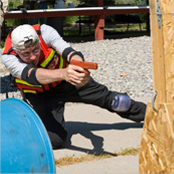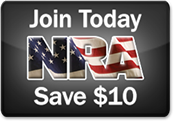Articles
Choosing a Defensive Handgun
by Chris Upchurch
In the previous article on What to Bring to a Utah Polite Society Event, I wimped out. Rather than delve into the potentially controversial topic of what sort of handgun is best for self-defense, I just talked about what makes and models we commonly saw at our events. This post is intended to address choosing a defensive handgun more thoroughly.
Before we begin a couple of caveats: Which gun and caliber are best for self-defense is a controversial topic. Everyone from true high-speed low-drag operators to armchair commandos has an opinion. The advice in this article is based on my opinions. These opinions stem mostly from shooting at Utah Polite Society events, taking some classes from Gabe Suarez, and perhaps most importantly, watching other people, particularly novice shooters, at our monthly events.
The advice in this article is intended for novice shooters. I'd like to think that even some more experienced folks may be able to get something out of it. However, if you are an experienced shooter and you find something you disagree with, keep in mind just be something that doesn't apply to you.
Second, this article is intended for folks who haven't yet bought their first defensive handgun. If you have a handgun please don't go run out and buy another gun just because your original choice runs contrary to the advice in this article. You will probably be better served bringing your current gun to a few of our events before making a decision. The gun you have may end up working fine for you. If you do decide to go out and get a different gun, having a bit of shooting experience under your belt will help you make a better choice. Reading this article is not a substitute for actual experience.
What Are You Buying a Defensive Handgun For?
A defensive handgun is not a magic talisman that will keep you safe from harm. Nor is it a magic wand that will force a bad person to do what you say. A handgun is a fighting tool, a killing tool, a tool of last resort which you may someday have to use to save your life or the life of a loved one. The ultimate question when trying to decide on a defensive handgun is, Which gun will do the best job of keeping me alive?
A lot of folks, particularly those who are new to concealed carry or who don't have any practical shooting experience, seem to loose sight of this. Rather than thinking about a pistol's fighting qualities, they concentrate on comfort or concealability. How many rounds are shot in the average gunfight is a perennial question on Internet gun forums. The people asking it generally want to know the absolute smallest, least capable gun they can get away with carrying. This makes about as much sense as buying the minimum possible airbag, fire extinguisher, or parachute. A defensive firearm is a vital piece of emergency equipment, your life will depend on if you ever have to use it. Comfort and concealability are important, but they pale in comparison to a handgun's fighting qualities. As Clint Smith says, A handgun should be comforting, not comfortable.
What's Important When Choosing a Handgun?
If you frequent gun shops or Internet discussion boards on the subject, you will be bombarded by opinions about what sort of pistol is best for self defense. Some folks will tell you that if your pistol isn't a .45 you might as well be armed with a sharp stick. Others say that you need at least a dozen rounds before you can even begin to consider defending yourself. Every make and model has its own cheerleading squad trying to convince you that their favorite gun is the best.
The truth is the most important thing to look for when choosing a defensive handgun is a pistol that you can shoot well. Caliber and magazine capacity are important features, but the biggest hip howitzer in the world isn't going to do you a bit of good if you can't hit your assailant with it. Unfortunately, personal fit is where most gun buying advice, particularly on the internet, falls short. As I said in the equipment article, most people who tell you which gun you should buy are telling you what works for them, which may or may not have any relevance to what will work for you. That's why this article is titled "Choosing a Defensive Handgun" rather than "What Defensive Handgun You Should Buy."
The best pistol buying advice comes from someone who has some experience, and who has seen you shoot a pistol. If someone who knows what they are doing watches carefully while you are shooting, they can give you a lot of good advice. They can tell you how well your current gun is working for you, and where it may be falling short. They may be able to point you in the direction of some better options. This is another reason to hold off on buying a new pistol until after you've come to one of our events, since we have quite a few folks who can give you very good advice.
So what qualities are important in choosing a defensive handgun? Most importantly, you need to be able to shoot it accurately, misses don't stop an attacker. It needs to work absolutely reliably, if it jams or breaks in a fight it could get you killed. Similarly, you need to be able to operate it in what will probably be the most stressful situation of your life, with a full fledged fight or flight reaction and adrenaline coursing through your veins. Finally, the rounds it fires need to be powerful enough to stop an assailant and the gun needs to hold enough rounds to disable all of the assailants.
Personally, I carry a Glock 21. It's big, heavy, and ugly as sin. It has no character. It's not going to impress firearms aficionados the way a high-end 1911 or a fine revolver might. No matter how long I carry it, it's not a gun I'm ever going to love. None of that matters. What matters is that I shoot it well, it's extremely reliable, and it carries 14 rounds of .45 ACP. I have concluded that it's the handgun I want to have in my hand if someone is trying to kill me.
Finding a Pistol that Fits
The two most important parts of choosing a gun that will shoot well for you are getting a gun that fits your hand, and choosing a gun and caliber combination with recoil you can handle.
In finding a gun that fits your hand, the most important feature is the trigger reach. Trigger reach is the distance between the back of the grip and the trigger. When gripping the gun with your index finger held straight and resting on the trigger guard, the trigger should be next to the index finger's middle knuckle. If the trigger reach is much too long, a shooter often tries to correct this by holding the gun incorrectly. When a pistol is gripped properly in one hand, the barrel should be in line with the bones of the forearm. If the trigger reach is too long, the shooter may grip the gun so that it ends up to one side of the forearm bones, rather than in line with it.



